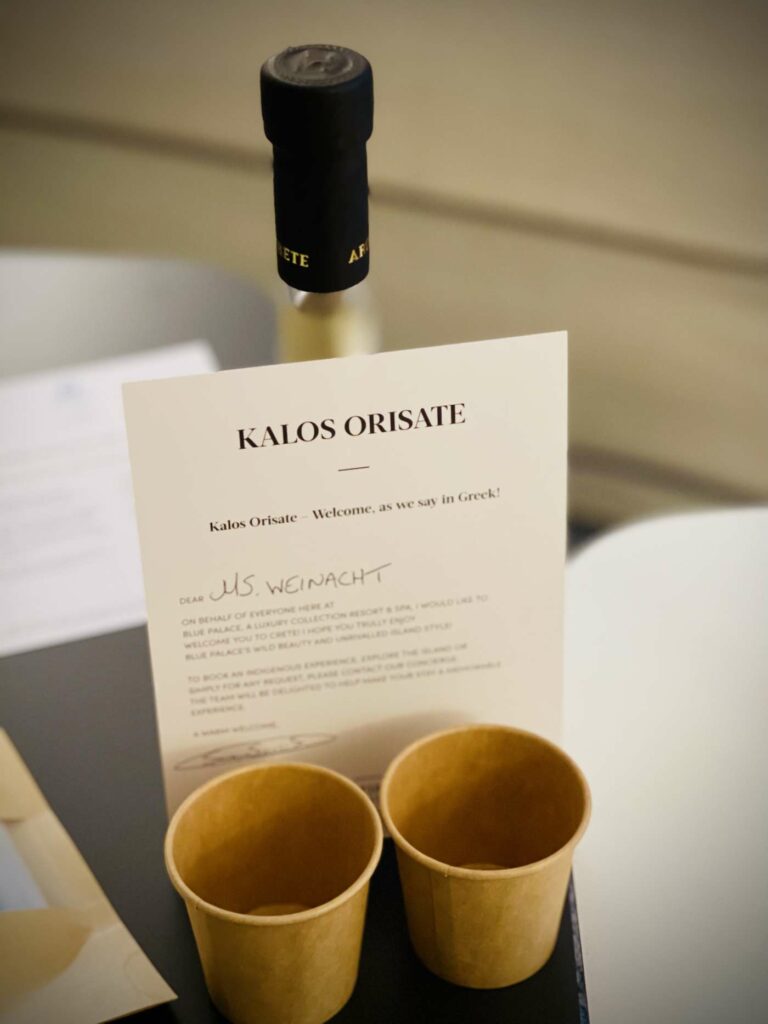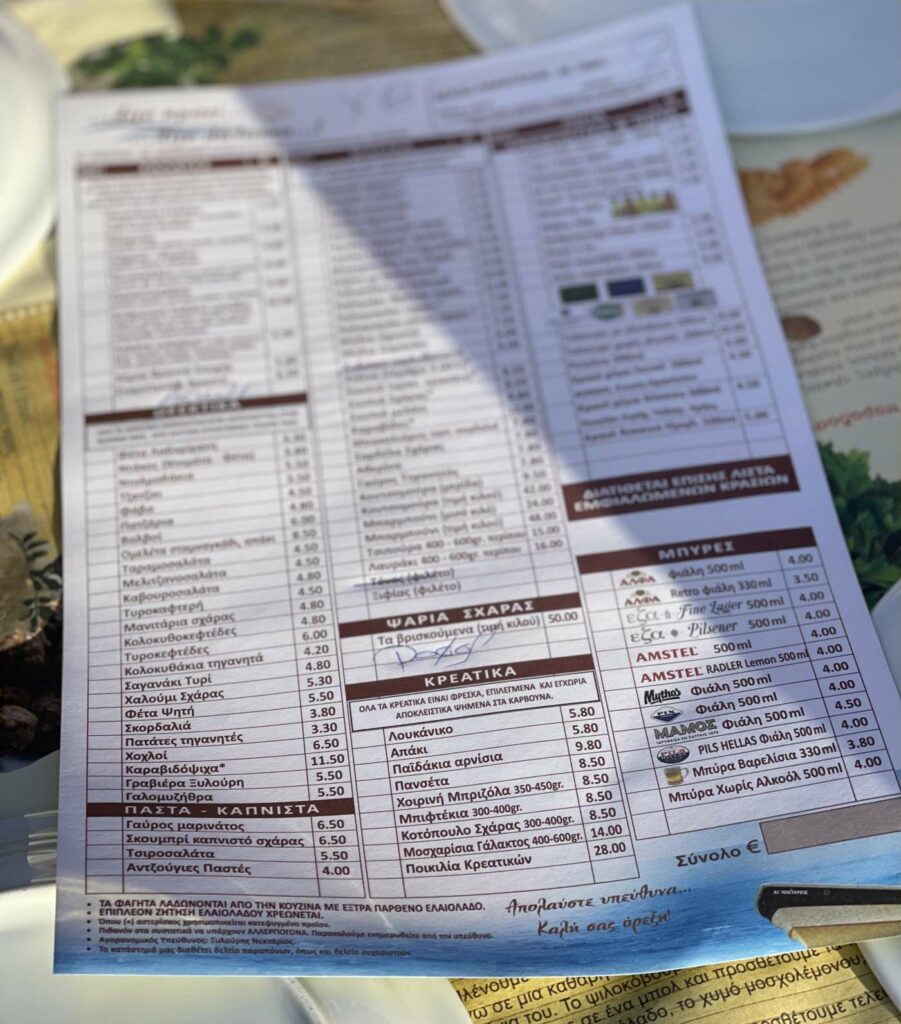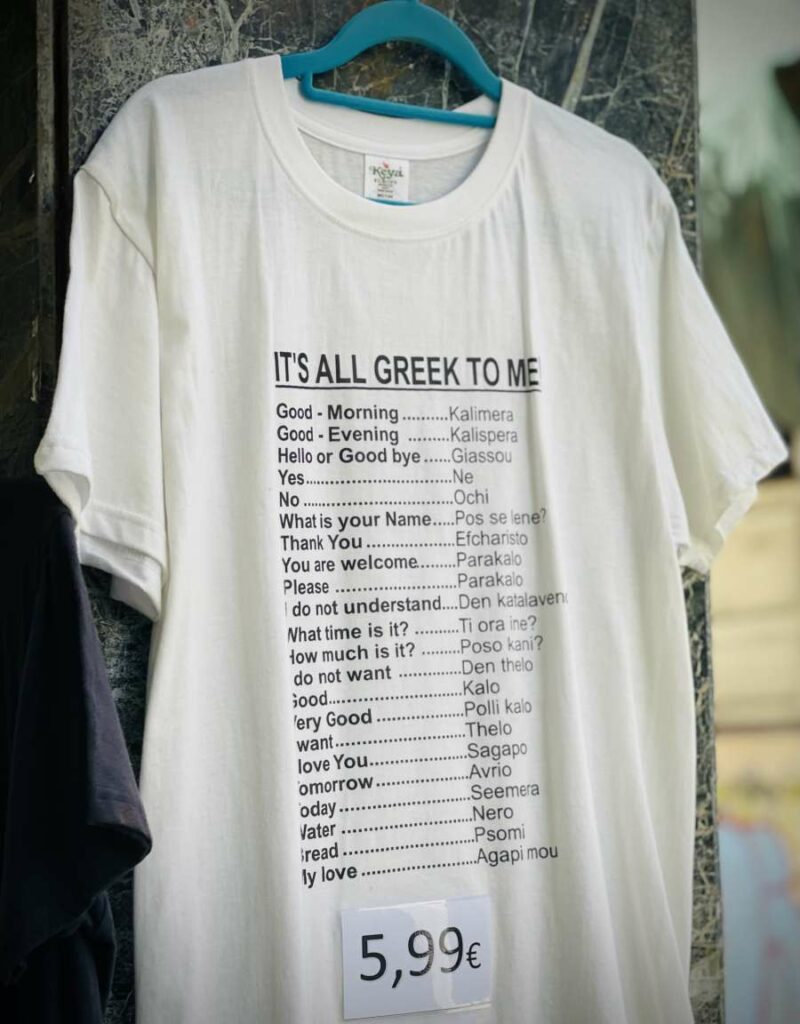Agreed, Greek’s a difficult language to master, but picking up a few words isn’t that hard. By learning just a few phrases and commonly used terms before or during your Greece visit, you’ll make an instant connection with the locals: Even just a little Greek goes a long way. Going that extra mile is what sets true travelers apart from tourists.
Greek Greetings
- Geiá sou (Γειά σου) means Hello and is pronounced YAH soo
- Yassas (Γειασας) is another way to say “hello” in Greek, and it is the more formal or polite version of “Geiá sou”. Use it with people you don’t know well, older people, or in more formal situations. The pronunciation is yah-SAHSS (with the emphasis on the second syllable).
- Efcharistó (Ευχαριστώ) is Greek for Thank you and a word worth practicing: ef-hah-rees-TOH just like the next one
- Parakaló (Παρακαλώ) is, you may have guessed it already, Gree for Please: pah-rah-KAH-loh
- Ti káneis? (Τι κάνεις) – How are you? (tee KAH-nees?)
- Kaliméra (Καλημέρα) – Good morning (kah-lee-MEH-rah)
- Kalispéra (Καλησπέρα) – Good evening (kah-lee-SPEH-rah)
- Kaliny̱chta (Καληνύχτα) – Good night (kah-lee-NEE-h-tah)
Don’t worry too much about getting the pronunciations perfectly right from our quick Greek language tutorial. This simplified pronunciations are based on standardized modern Greek. They will differ slightly depending on regional variations or accents.
Helpful everyday Greek
- Ναι (Nai) – Yes (neh)
- Όχι (Óchi) – No (OH-hee)
- Συγνώμη (Sygnó̱mi̱) – Excuse me/sorry (seen-GNOH-mee)
Did you notice something? We started with the word in Greek and spelled also using the Greek alphabet. A little harder, right? Thankfully the majority of signs and written materials you’ll encounter as a traveler when you visit Greece are spelled using the more familiar Latin alphabet. And for all foodies, great news, most restaurants will either offer you a Greek menu with translations or have a separate overview of the delicious eats just in English (or German, or French). The only downside to pre-translated printed menus is that daily or seasonal specials often aren’t included here. Thus always ask your host about daily or weekly specials. Often these are the must-try dishes!



Culinary Greek for Foodies
- Yia mas (Γεια μας) or Yamas (ΥΓΕΙΑ μας) is a very common Greek expression used when making a toast, and it is equivalent to saying “cheers” or “to your health” in English. The word “yamas” literally means “health” or “our health”, and it is a way of wishing good health to the people you are drinking with. The pronunciation is yah-MAS (with the emphasis on the second syllable). This expression is typically used in informal or casual situations when drinking with friends, family, or acquaintances. So, if you’re hanging out with friends in Greece — or see Greeks in a group – you’ll be seeing a lot of raised glass here “Yamas!” again and again: to wish everyone good health and happiness.
- The most common way to say “cheers” in Greek is Ygeia! (ΥΓΕΙΑ), which literally means “health!” and is often used to toast with a drink. The pronunciation is ee-YEH-yah.
- Another common way to say “cheers” in Greek is Stin ygeia mas! (ΣΤΗΝ ΥΓΕΙΑ ΜΑΣ!”), which means “To our health!” The pronunciation is steen ee-YEH-yah mass. And to make it even more complicated, it could also be Stin iyía mas (Στην υγειά μας) pronounced as stin ee-YAH mas
- Kalí órexi (Καλή όρεξη) – Bon appétit (kah-LEE OH-reh-ksi)
- Neró (Νερό) – Water (neh-ROH)
- Kafés (Καφές) – Coffee (kah-FES)
- Glykó (Γλυκό) – Dessert (GLEE-koh)

Not that much into languages?
In addition to google translate there’s always the infamous classic souvenir shirt to buy that says “It’s all Greek to me”.
But remember, Greece is quite a hot country, so either you’ll bring some extra strength deodorant, buy a few of those shorts, or why not give learning just a few Greek word just one more try.
We strongly believe that you too can do it!
p.s. We’ll bid farewell with one fun fact about surely one of the more difficult languages in our beautiful world. Now that you know some Greek, mark your calendars on February 9: It’s the annual Greek Language Day. As the world’s oldest recorded living language, spoken in the same geographical region for around 4,000 years, Greek words have been absorbed into many other Indo-European languages, including English, French and Italian. Around 10% of Spanish words, for example, are borrowed from Greek. To learn more about the history of the Greek language, take a look here on Greece-is.com.
And: Keep on practicing your Greek; ideally in Greece on your next Inside Europe Travel Experience. Our Greek hosts are always bi-lingual and love sharing their language with curious travelers.

